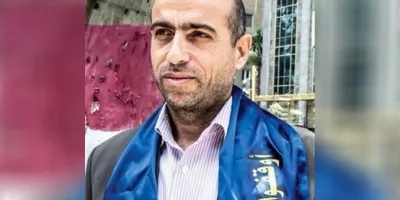The Degrading Treatment of Death Row Detainees in Alabadia Prison.
Geneva 23 August 2017
The Committee for Justice calls upon the prison administration of Damanhur Public Prison in Alabadia to provide their detainees with humane and adequate detention conditions, including detainees on death row. Currently, there are six detainees in Alabadia Prison facing the death penalty and held in degrading conditions.
“We do not object to God’s will, just please treat them as humans” -family of one of the detainees
Information in this press release is based on interviews with the families of three of the six detainees: Jamil Khamis Saad Hanish, Mohammed Yousef Al Sabaa, and Mohamed Khaled Mahmoud El Fayoumi.
On 18 May 2017, the six detainees were separated from the rest of detainees and moved to the death penalty cells on the day their case papers were sent to the Mufti. This happened despite their sentence being confirmed 2 months later, on 17 July 2017, and the sentence not yet being finalized. Thus, they were subjected to the grievous mental duress that accompanies being separated from the rest of the prison and awaiting death long before they had to.
According to Mohammed Yousef Al Sabaa’s family who spoke to CFJ: “their mental health is shattered, and they feel that they are living in a grave.”
Every three detainees are imprisoned together in an estimated 1.5×3 meters cell for more than 23 hours a day. The cell has no electronic lights and no light comes from the outside. They only feel the sunlight for about half an hour a day when they are brought out to defecate. The prison administration gives them plastic bags to defecate in for the remaining 23 hours that they are locked in the cell. These plastic bags are not removed right away but are removed the next time the guards open the door. The detainees complained to their families of the intensive smell due to the plastic bags that are left in the cell for hours coupled with the lack of ventilation and immense heat. The temperature in Damnhour where the prison is located currently reaches 42 °C. Subsequently, the detainees eat the bare minimum as to prevent themselves from using the plastic bags. This coupled with restriction on admitting food by families into the prison caused the detainees to drastically lose weight. Their clothes are also kept dirty and not regularly cleaned. According to the family of Mohammed Yousef Al Sabaa, he would put aside an outfit to wear to the visits to not show his family the dirty conditions they are kept in.
The heat, lack of ventilation, lack of exposure to sunlight, inadequate food intake, and unsanitary conditions in a confined cell has already taken its toll on their health. They suffer from rashes, allergy in their eyes, and stomach pain. According to the family of Mohammed Yousef Al Sabaa, on 10 or 11 July 2017, three of the detainees: Mohamed Khaled Mahmoud El Fayoumi, Jamil Khamis Saad Hanish, and Reda Ahmed Al Shaer had to be send to the prison’s hospital after struggling to breath and feeling chest pains.
According to his family, Jamil Khamis Saad Hanish suffers from chronic inflammation in his stomach as well as colon and hemorrhoids problems. He also recently asked his family to try to get him examined as he is showing symptoms of Jaundice (his eyes have turned yellow) and kidney problems; however, he has yet to be examined.
The families also complained of the conditions of the visits. They are only allowed 10 or 15 minutes visits. The food the family brings often goes bad from the long wait for the visit and the heat. The detainees are brought out to visits in handcuffs. The visitation place is also dirty, and at times, the families and detainees would have the visits sitting on the dirty ground. These visitation conditions aggravate the suffering of the detainees and their families, especially the young children of the detainees who are emotionally scarred by the experience. From 16 August onward, their visits have been downgraded to only one visit a month.
Keeping the detainees in these degrading, unsanitary, and mentally harming conditions violates Egypt’s legal obligation under Egyptian and international laws and norms. In article 56, the Egyptian constitution affirms that a prison is a place of correction and rehabilitation and that actions inconsistent with human dignity or which endanger human health shall be prohibited.
In the United Nations Standard Minimum Rules for the Treatment of Prisoners that was adopted unanimously by the UN General Assembly in 2015: Rule 13 states that “All accommodation provided for the use of prisoners and in particular all sleeping accommodation shall meet all requirements of health, due regard being paid to climatic conditions and particularly to cubic content of air, minimum floor space, lighting, heating and ventilation.” While Rule 15 stipulates that “The sanitary installations shall be adequate to enable every prisoner to comply with the needs of nature when necessary and in a clean and decent manner.”
The prison administration must also provide the detainees with adequate medical care as the Egyptian constitution guarantees the right to health to every citizen in article 18. In addition, general comment no.14 on article 12 of the International Covenant on Economic, Social and Cultural Rights, which Egypt ratified, provides that “States are under the obligation to respect the right to health by refraining from denying or limiting equal access for all persons, including prisoners or detainees.”
Three of the detainees: Khaled Mohamed Saad Tammam, Nasr Mohamed Nasr El-Shandidi, and Reda Ahmed Al Shaer are on case 19/2016 Felonies Downtown Damanhur also known as the bombing of Damanhur Public Bus Stop case. While the other three: Jamil Khamis Saad Hanish, Mohammed Yousef Al Sabaa, and Mohamed Khaled Mahmoud El Fayoumi are on case 2001/2015 Felonies Downtown Damanhur also known as the Firing on Abou El Matamir Police Station case. Allegedly, no deaths occurred as a result of both incidents other than the death of the perpetrators of the bombing of Damanhur Public Bus Stop.
All six detainees were reportedly subjected to enforced disappearance and torture. In one instance, Mohammed Yousef Al Sabaa was arrested and disappeared on 11 April 2014 before appearing on 24 April 2014. On 24 April 2014, his family filed a report in Abou El Matamir Prosecution on his arrest, disappearance, and torture after they received his belongings from the authority including the shirt he was wearing when he was arrested. The shirt was presented as evidence of torture as it was covered with blood.
The Committee for Justice welcomes the step taken by the prison administration to better their detention conditions by providing the detainees with a water cooler paid for by their families; however, they must continue and provide them with an adequate detention facility that preserves their health and dignity.
While the state may have declared that their crimes are worthy of death, as they remain in their custody, the state is obliged to fulfil its legal and moral duty to preserve their dignity and respects their basic rights.






